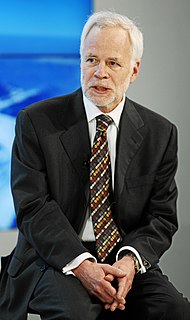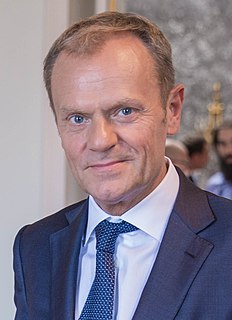A Quote by Barry Eichengreen
The 1992 crisis proved that the existing system was unstable. Not moving forward to the euro would have set up Europe for even more disruptive crises.
Related Quotes
The reason why it is so difficult for existing firms to capitalize on disruptive innovations is that their processes and their business model that make them good at the existing business actually make them bad at competing for the disruption. Companies in fact are specifically organized to under-invest in disruptive innovations! This is one reason why we often suggest that companies set up separate teams or groups to commercialize disruptive innovations. When disruptive innovations have to fight with other innovations for resources, they tend to lose out.
The fact that we're going through a crisis is an opportunity for Europe to be more coordinated and more integrated. We're actually talking about a European Monetary Fund or euro bonds, about guarantees for countries, about economic governance in the European Union. That shows the strength of Europe.
Thanks to the euro, our pockets will soon hold solid evidence of a European identity. We need to build on this, and make the euro more than a currency and Europe more than a territory... In the next six months, we will talk a lot about political union, and rightly so. Political union is inseparable from economic union. Stronger growth and Euorpean integration are related issues. In both areas we will take concrete steps forward.
It's the invincible arrogance of Europe's elites that gets me. These are people who have seen the euro collapse. These are people who are presiding over a migration crisis on their borders, and yet do they ever acknowledge that they need to change? No. They say they need more integration, more of our money, more control over this country.
Companies, in fact, are specifically organized to under-invest in disruptive innovations! This is one reason why we often suggest that companies set up separate teams or groups to commercialize disruptive innovations. When disruptive innovations have to fight with other innovations for resources, they tend to lose out.
Europe is sort of like the Soviet Union in the '30s and '40s. There was an argument, is it reformable or not? There is a feeling, and I think it's correct, that the European Union, the eurozone, and the euro, is not reformable, as a result of the Lisbon treaties and the other treaties that have created the euro. Europe has to be taken apart in order to be put together not on a right-wing, neoliberal basis, but on a more social basis.
With apologies to the green movement, "sustainability" is a myth. History and archaeology show that societies are always moving to the edge of crisis, "falling forward" through growth, but then responding often successfully to the problems created. What we can hope for is that with a somewhat more controlled level of growth, and with longer-term preparations for change, we can keep responding to the inevitable smaller crises, as they arise, and continue to postpone until later and later the, perhaps ultimately inevitable, end of our civilization.




































